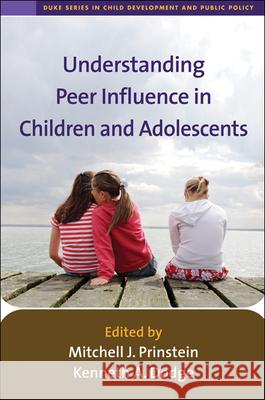Understanding Peer Influence in Children and Adolescents » książka



Understanding Peer Influence in Children and Adolescents
ISBN-13: 9781606236475 / Angielski / Miękka / 2010 / 255 str.
Understanding Peer Influence in Children and Adolescents
ISBN-13: 9781606236475 / Angielski / Miękka / 2010 / 255 str.
(netto: 167,88 VAT: 5%)
Najniższa cena z 30 dni: 166,18
ok. 22 dni roboczych.
Darmowa dostawa!
Presents a comprehensive framework for understanding the processes by which peers shape each other's attitudes and behavior. This book explores implications for intervention and prevention.
Wydanie ilustrowane
The topic of peer influences has long been important to the field. This remarkable volume from distinguished editors and contributors proposes original and compelling conceptual models that will elucidate peer influence processes for researchers and students alike. In addition, many of the authors discuss general and specific implications of their work for prevention and intervention programs. This book would be an excellent text for advanced undergraduates, master's students, and beginning doctoral students in developmental, educational, school, and clinical psychology.--W. Andrew Collins, PhD, Morse-Alumni Distinguished Teaching Professor, Institute of Child Development, University of Minnesota
This volume brings together leading researchers to piece together the puzzle of peer influences, highlighting their mechanisms, moderators, contexts, and the potential for interventions that capitalize on positive peer processes. With this understanding, we can begin to consider the developmental supports that children and youth require individually and collectively to promote social adaptation. The picture of peer processes emerging from this volume is critical to informing the strategies and policies of a broad range of professionals responsible for children and youth.--Debra Pepler, PhD, LaMarsh Centre for Research on Violence and Conflict Resolution, York University
While it has long been known that adolescents influence one another, insufficient attention has been given to how, where, and when these influences occur. This first-rate volume considers the mechanisms and processes involved in peer influence from a variety of conceptual and theoretical viewpoints and presents a fascinating sampling of new research.--Willard W. Hartup, EdD, Regents' Professor Emeritus, Institute of Child Development, University of Minnesota
I. Introduction
1. Current Issues in Peer Influence Research, Mitchell J. Prinstein and Kenneth A. Dodge
II. Peer Influence Mechanisms
2. A Comprehensive Conceptualization of the Peer Influence Process in Adolescence, B. Bradford Brown, Jeremy P. Bakken, Suzanne W. Ameringer, and Shelly D. Mahon
3. Cognitive Social Influence: Moderation, Mediation, Modification, and...the Media, Frederick X. Gibbons, Elizabeth A. Pomery, and Meg Gerrard
4. Dynamics and Ecology of Adolescent Peer Influence, Thomas J. Dishion, Timothy F. Piehler, and Michael W. Myers
5. Deviance Regulation Theory: Applications to Adolescent Social Influence, Hart Blanton and Melissa Burkley
III. Altering Peer Influence Effects: Moderators and Interventions
6. Variation in Patterns of Peer Influence: Considerations of Self and Other, William M. Bukowski, Ana Maria Velasquez, and Mara Brendgen
7. Adolescent Peer Influences: Beyond the Dark Side, Joseph P. Allen and Jill Antonishak
8. Mobilizing and Weakening Peer Influence as Mechanisms for Changing Behavior: Implications for Alcohol Intervention Programs, Deborah A. Prentice
9. Identity Signaling, Social Influence, and Social Contagion, Jonah Berger
IV. Underexplored Contexts for Potential Peer Influence Effects
10. Homophily in Adolescent Romantic Relationships, Wyndol Furman and Valerie A. Simon
11. Peer Influence in Involuntary Social Groups: Lessons from Research on Bullying, Jaana Juvonen and Adriana Galván
Mitchell J. Prinstein, PhD, ABPP, is the John Van Seters Professor of Psychology and Neuroscience and Director of Clinical Psychology at the University of North Carolina at Chapel Hill. His research examines interpersonal models of internalizing symptoms and health-risk behaviors among adolescents, with a focus on the unique role of peer relationships in the developmental psychopathology of depression, self-injury, and suicidality. Dr. Prinstein is a past editor of the Journal of Clinical Child and Adolescent Psychology and a past president of the Society for a Science of Clinical Psychology and the Society for Clinical Child and Adolescent Psychology. He is a recipient of awards including the Theodore Blau Early Career Award from the Society of Clinical Psychology of the American Psychological Association (APA), the Brickell Memorial Award for research on suicidality from Columbia University, the Mentor Award from the Association for Behavioral and Cognitive Therapies, the Beverly Thorn Award for Outstanding Service from the Council of University Directors of Clinical Psychology, and the Raymond D. Fowler Award for Outstanding Contribution to the Professional Development of Graduate Students from the American Psychological Association of Graduate Students.
Kenneth A. Dodge, PhD, is the Pritzker Professor of Public Policy and Psychology and Neuroscience at Duke University. He is Founding and Emeritus Director of the Duke Center for Child and Family Policy. A clinical and developmental psychologist, Dr. Dodge studies early childhood development, prevention of violent behavior in the family, and public policy to improve population outcomes for communities. He is the developer of Family Connects, a population approach to improve children’s outcomes in the first year of life. The author of more than 500 highly cited scientific articles, which have been cited more than 100,000 times, Dr. Dodge has been elected into the National Academy of Medicine and is the 2019–2021 President of the Society for Research in Child Development.
1997-2026 DolnySlask.com Agencja Internetowa
KrainaKsiazek.PL - Księgarnia Internetowa









